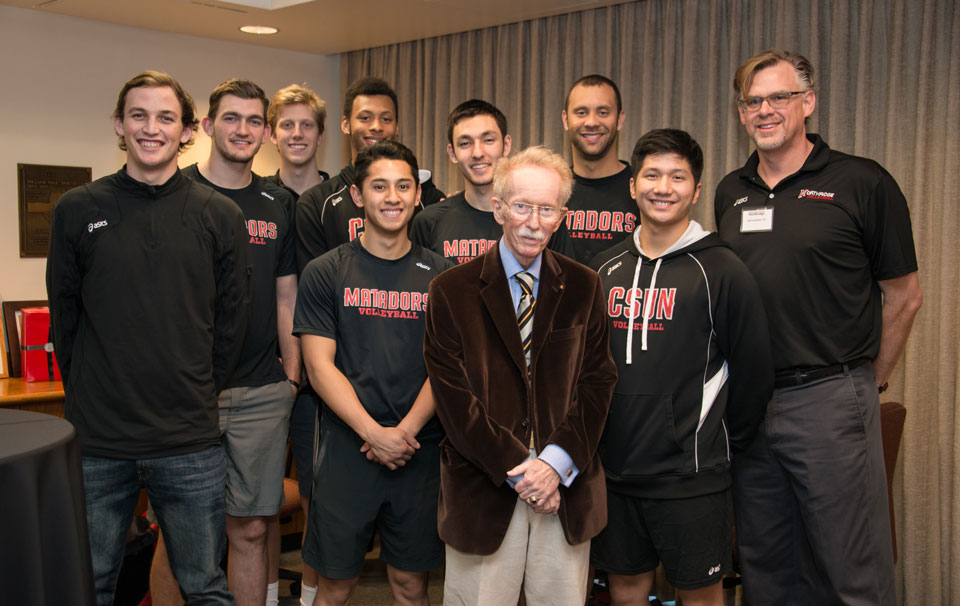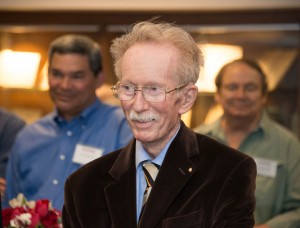Legendary History Professor James Sefton Leaves $1 Million Endowment to CSUN Men’s Volleyball

Members of the CSUN men’s volleyball team, with head coach Jeff Campbell (far right), joined Professor James Sefton (front, center) at a celebration honoring him for 50 years teaching history — and supporting Matador student-athletes, on Feb. 12, 2015. Photo by Lee Choo.
Known for his straight-shooting candor, humor and unceasing demand for excellence, James Sefton served as a mentor and counselor to students from the day he set foot on the campus of then-San Fernando Valley State College in 1965.
Sefton taught American military and naval history, World War II, constitutional history, and his specialty, Civil War and Reconstruction. But the professor himself was the true historic institution, marking 53 years of teaching at CSUN in 2018. Sefton, known as “Doc” by the hundreds of scholars he mentored, estimated that he had taught 11,000 students over five decades at CSUN. On Oct. 4, 2018, Sefton died in his sleep, at age 78.
In his will, Sefton remembered CSUN and its students — particularly in one area that was near and dear to his heart for years: the CSUN Men’s Volleyball program. In 2019, according to Sefton’s wishes, his trust gave $1 million to establish the James E. Sefton Men’s Volleyball Scholarship Endowment at CSUN, to provide annual scholarships to student-athletes in men’s volleyball.
“Dr. Sefton was a great supporter of the university, and he had a very special relationship with the men’s volleyball team,” said head coach Jeff Campbell. “He came out and supported us by being at our matches, both home and away, and had a very special bond with our players.
“He wanted to endow the men’s volleyball team as part of his legacy,” Campbell said. “His generosity will ensure that we have all the opportunities that every other school has in terms of financial backing. It will also help us maintain our elite academic status, and our status as a nationally ranked men’s volleyball program. This will give us the ability to compete with the top volleyball programs in the country, year in and year out. We thank him, we appreciate him and recognize him for his tremendous support.”
Sefton devoted himself to generations of Matador student-athletes. He served as faculty representative to the National Collegiate Athletic Association from 1981-90. He also initiated CSUN’s annual academic recognition of student-athletes, now known as the Varsity N honor roll.
“He advised [the men’s volleyball team] and counseled them on academics, which resulted in the men’s volleyball program having one of the highest GPAs of any team on campus,” Campbell said. “He was definitely a large part of our academic success, and he took a lot of pride in that.”
An ardent supporter of college sports, Sefton channeled his lifelong passion and talent for photography into capturing some 600 CSUN games and athletic events. Had he pursued sports photography instead of teaching, Sefton quipped, he “could have shot covers for Sports Illustrated — at a lot more money.” His images of Midwestern landscapes, “Remote Roads: Photographs Along the Way,” were the subject of an exhibit at the CSUN Art Galleries, and his art photography was shown at various California venues. Sefton photographed CSUN football games and created slideshows for annual team banquets, even traveling with the team for many years. After CSUN dropped its football program in 2001, he focused his lens on the men’s volleyball program.

The late professor of history James Sefton, pictured at a 2015 event celebrating his 50 years teaching at CSUN. Photo by Lee Choo.
Born in San Francisco, Sefton moved to the Los Angeles area as a boy. He graduated from Hollywood High School and went on to earn a bachelor’s degree (1961) and Ph.D. (1965) in history at UCLA.
“In many ways, Jim came from a similar background as many of our students,” CSUN history professor and longtime colleague Richard Horowitz reflected this past fall. Sefton’s mother was a commercial baker and extremely hard of hearing, Horowitz said. Sefton’s father passed away when he was 5 or 6 years old, he added. “His family was not well-off. He benefitted from the California education system, and he worked really, really hard along the way. He came by his crustiness from a lot of hard work.”
Horowitz noted that Sefton understood the impact of scholarships on CSUN students’ lives and higher education. He administered the Department of History’s scholarships for many years, Horowitz said. “He wanted to make sure things were done fairly,” Horowitz said. “His approach was to support as many students [through scholarships] as he could.”
When Sefton celebrated 50 years of teaching at CSUN, former provost and English professor Harry Hellenbrand hailed Sefton and the contributions he made to the university.
“Friend, guide and teacher are the words used a lot to describe Jim Sefton,” Hellenbrand said. “It’s very rare that you come across a professor who can fill those roles. [He] played an incredibly important role for me as provost, as one of the three or four people at the institution whom I can trust to say what they think — and not mince words. He is one of the North Stars of this campus.”
“He taught me the true meaning of intellectual curiosity,” added retired Navy Capt. Dallas Bethea, who earned his bachelor’s degree in history from Valley State College in 1969. “And that when you make a statement of fact, make sure it is absolutely correct — it served me well during my years in the Navy and the Pentagon.”
Bethea met Sefton in 1966 when he talked his way into the young professor’s full class on Civil War history. “My ancestors fought for the Confederacy, so I did add some diversity [to the class],” said Bethea, who lives in Virginia. “I’m proud to say I earned an A.”
The former student and longtime friend also established a scholarship fund in Sefton’s name in CSUN’s Department of History.
A visitor to his office once called “Doc” a “‘strange hybrid — part of you is Mr. Chips and part a Marine drill instructor,’” Sefton once recalled, referencing the famous literary character and schoolteacher Mr. Chipping in James Hilton’s novella “Goodbye, Mr. Chips” — later adapted for film and TV. Sefton liked the description, but colleges now lean toward Mr. Chips, he said. In fact, most students need the drill instructor to teach responsibility and consequences, as they did 40 years ago.
But he added, “The kids who are good today would have been good 40 years ago.”
Sefton had no children of his own, but hundreds of former students and student-athletes considered him a father figure, a mentor, a rock.
“He [was] an amazing teacher and everything, but I’m a stutterer — and he was also a counselor for me,” said Brian Bold, who earned his bachelor’s degree in history from CSUN in 2009. “He [had] such a warmth with students. When I was in college, my stutter was worse. I wasn’t sure of myself, and he helped me through it,” said Bold, who became an occupational therapist. “Before and after class, we’d have quick chats, and we’d have more in-depth talks in his office.”
At CSUN, on its volleyball courts and in the lives of scores of alumni, Sefton’s legacy lives on.
“The ‘mystic chords of memory’ — that was [Abraham] Lincoln’s way of saying that, because the North and South had so much shared history, the Union would survive. I think that fits college life,” Sefton said at his 50th anniversary celebration. “So much that we do in college centers around memory and its preservation. So, the ‘mystic chords of memory’ bind me to the 11,000 students I have taught.”

 experience
experience